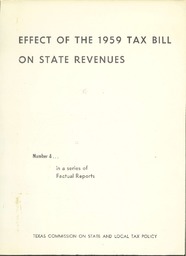
ATTENTION: The works hosted here are being migrated to a new repository that will consolidate resources, improve discoverability, and better show UTA's research impact on the global community. We will update authors as the migration progresses. Please see MavMatrix for more information.
Show simple item record
| dc.contributor | Texas. Committee on State and Local Tax Policy. | |
| dc.date.accessioned | 2017-04-07T16:48:40Z | |
| dc.date.available | 2017-04-07T16:48:40Z | |
| dc.identifier.uri | http://hdl.handle.net/10106/26541 | |
| dc.description | Cover title. | |
| dc.description.abstract | The most important aspect of the 1959 tax legislation was
its continuation of Texas' traditional policy of selective
taxation. Accordingly this Commission directed its staff to
devote a major part of its attention to exploring that tax
policy, its implications and possible alternative tax policies.
The first report in this series - Our Texas Tax Policy:
Its History, Its Future - traced the history of our selective
tax policy with particular concentration on the past thirty
years. The second and third reports - State Tax Policy and
the Individual and State Tax Policy and Business - discussed
the effect of a selective tax policy on individual and business
taxpayers and explored the effect of changing this policy to
one of general taxation.
This fourth report is not concerned with the policy aspects
of the 1959 tax legislation, but rather with the revenue effects
of that tax bill. It is now generally recognized that House
Bill 11, 56th Legislature, Third Called Session, fell substantially
short of producing the state revenue anticipated from it.
This, plus the sharp drop in oil production, accounts for the
fact that the State once again faces a tax problem of major proportions.
In this report an attempt is made to determine the
amount by which House Bill 11 fell short of expectations and to
explore the reasons why it was short.
In addition to the revenue realized directly from the tax
bill of 1959, State tax revenues have been increased as a result
of the reorganization of the State Comptroller's Department
in accordance with enabling statutes enacted by the 56th Legislature
and in line with recommendations of the Texas Research
League. During the ten-month period from January 1 to October
31, 1960, the Field Operations Division made 3,291 taxpayer audits which resulted in a net increase in tax liability of
$2,086,000. It appears that field auditing will produce at least
two-and one-half times as much revenue as was normally realized
under the old organizational structure. This is a very good record
for the first year, and this Commission believes that State Comptroller
Calvert and his staff are to be commended on the success of
this phase of their departmental reorganization.
Research assistance has been made available to the Commission,
without cost to the State, by the Texas Research League, a non-profit
Texas corporation professionally engaged in governmental research and
financed by the voluntary contributions of public-spirited citizens
of this State. The research staff for this report consisted of James
W. McGrew, Director, Alan E. Barnes, Homer E. Scace and Bob Norwood.
The Commission and the staff wish to express their gratitude to State
Comptroller of Public Accounts Robert S. Calvert and the several members
of his Department who contributed their time and efforts in making
detailed financial data available for this report. | |
| dc.publisher | [Austin, 1960] Committee on State and Local Tax Policy. | |
| dc.subject.lcsh | Revenue -- Texas | |
| dc.title | Effect of the 1959 tax bill on state revenues. | |
| dc.identifier.oclc | (OCoLC)18065065 | |
| dc.title.series | Its Factual reports ; no. 4 | |
Files in this item
- Name:
- 399778.pdf
- Size:
- 11.39Mb
- Format:
- PDF
This item appears in the following Collection(s)
Show simple item record


